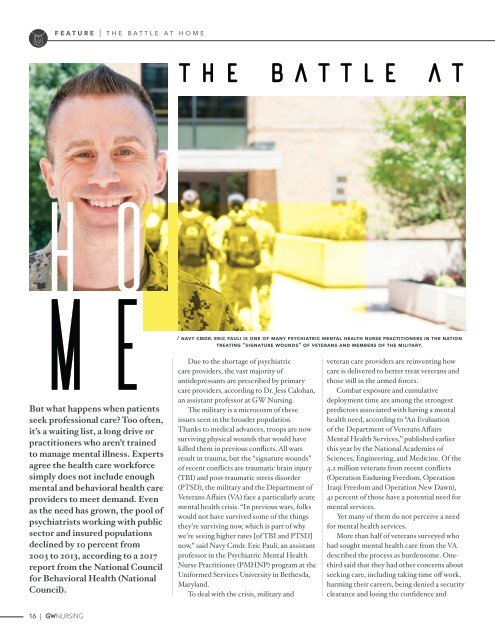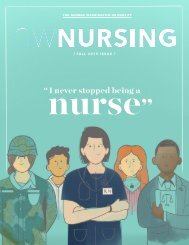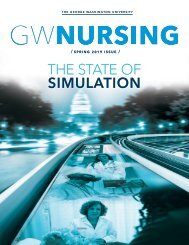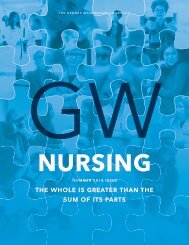GW Nursing Magazine Fall 2018
GW Nursing is a publication of the George Washington University School of Nursing. The magazine tells the story of GW nurses and their endeavors in the areas of education, research, policy and practice.
GW Nursing is a publication of the George Washington University School of Nursing. The magazine tells the story of GW nurses and their endeavors in the areas of education, research, policy and practice.
Create successful ePaper yourself
Turn your PDF publications into a flip-book with our unique Google optimized e-Paper software.
feature | the battle at home<br />
t h e b a t t l e a t<br />
ho<br />
me<br />
But what happens when patients<br />
seek professional care? Too often,<br />
it’s a waiting list, a long drive or<br />
practitioners who aren’t trained<br />
to manage mental illness. Experts<br />
agree the health care workforce<br />
simply does not include enough<br />
mental and behavioral health care<br />
providers to meet demand. Even<br />
as the need has grown, the pool of<br />
psychiatrists working with public<br />
sector and insured populations<br />
declined by 10 percent from<br />
2003 to 2013, according to a 2017<br />
report from the National Council<br />
for Behavioral Health (National<br />
Council).<br />
/ navy cmdr. eric pauli is one of many psychiatric mental health nurse practitioners in the nation<br />
treating “signature wounds” of veterans and members of the military.<br />
Due to the shortage of psychiatric<br />
care providers, the vast majority of<br />
antidepressants are prescribed by primary<br />
care providers, according to Dr. Jess Calohan,<br />
an assistant professor at <strong>GW</strong> <strong>Nursing</strong>.<br />
The military is a microcosm of these<br />
issues seen in the broader population.<br />
Thanks to medical advances, troops are now<br />
surviving physical wounds that would have<br />
killed them in previous conflicts. All wars<br />
result in trauma, but the “signature wounds”<br />
of recent conflicts are traumatic brain injury<br />
(TBI) and post-traumatic stress disorder<br />
(PTSD), the military and the Department of<br />
Veterans Affairs (VA) face a particularly acute<br />
mental health crisis. “In previous wars, folks<br />
would not have survived some of the things<br />
they’re surviving now, which is part of why<br />
we’re seeing higher rates [of TBI and PTSD]<br />
now,” said Navy Cmdr. Eric Pauli, an assistant<br />
professor in the Psychiatric Mental Health<br />
Nurse Practitioner (PMHNP) program at the<br />
Uniformed Services University in Bethesda,<br />
Maryland.<br />
To deal with the crisis, military and<br />
veteran care providers are reinventing how<br />
care is delivered to better treat veterans and<br />
those still in the armed forces.<br />
Combat exposure and cumulative<br />
deployment time are among the strongest<br />
predictors associated with having a mental<br />
health need, according to “An Evaluation<br />
of the Department of Veterans Affairs<br />
Mental Health Services,” published earlier<br />
this year by the National Academies of<br />
Sciences, Engineering, and Medicine. Of the<br />
4.2 million veterans from recent conflicts<br />
(Operation Enduring Freedom, Operation<br />
Iraqi Freedom and Operation New Dawn),<br />
41 percent of those have a potential need for<br />
mental services.<br />
Yet many of them do not perceive a need<br />
for mental health services.<br />
More than half of veterans surveyed who<br />
had sought mental health care from the VA<br />
described the process as burdensome. Onethird<br />
said that they had other concerns about<br />
seeking care, including taking time off work,<br />
harming their careers, being denied a security<br />
clearance and losing the confidence and<br />
16 |

















